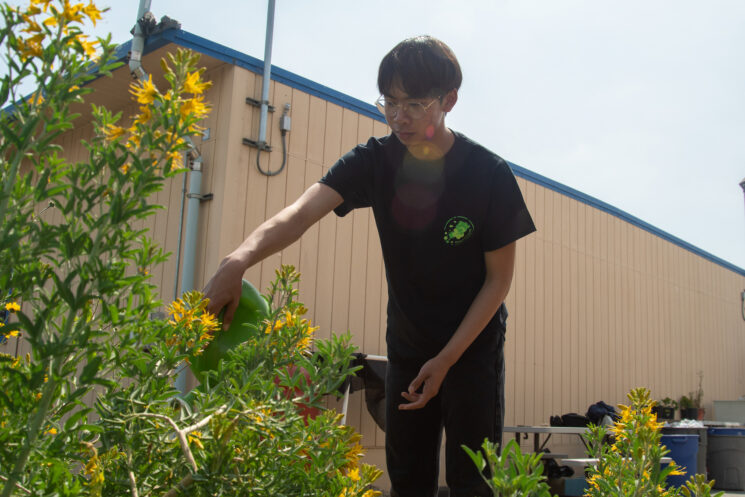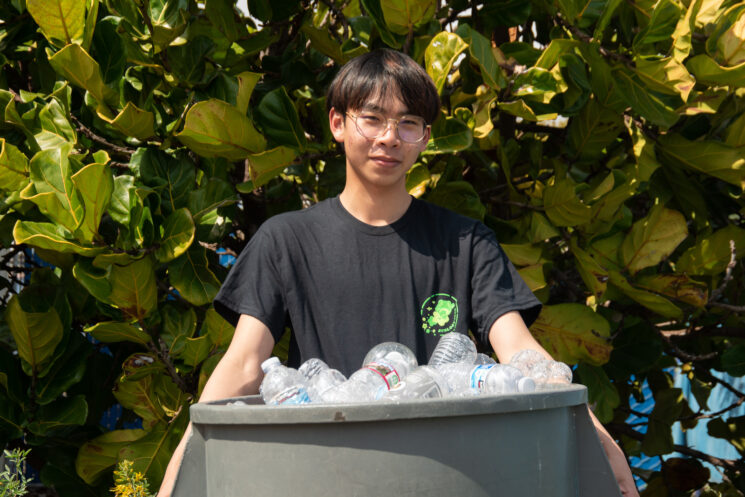
By Reese Meister
Giauy Ngo is not your typical club president. This isn’t just because he received this position after only one year as a member of the Ecology Club; when Ngo speaks about his work, his genuine excitement would be apparent to anyone.
Ngo’s interest in the environment bloomed early in his life, long before he even knew about the Ecology Club. As a child, he enjoyed spending time outdoors where he explored different plants, built waterfalls in the mud and observed fish ponds. It wasn’t until middle school, though, that Ngo’s love for nature began to translate to environmental activism.
“Once I shifted to my later years in high school… especially in junior and senior year, I got more into the mindset of environmentalism in a way where it’s not just activism—it’s actual action, like creating a garden for native plants and animals to thrive in,” Ngo said. “I like that more than the actual political aspect.”
It is no surprise that Ngo’s favorite class in high school has been AP Environmental Science, or that in his free time, he takes care of his fish, terrariums and house plants.
While his passion largely developed on his own, Ngo cites current club members and past board members, like Jessie Pham, as some of his inspirations. Ecology Club activities were limited in the year that Ngo joined because of the COVID-19 pandemic, but he eventually had the opportunity to become more involved through meetings in the club’s garden.
“During the gardening sessions, I could talk to the previous board about where they’re going with life, what the club [is] like or what it should be during a normal year,” Ngo said. “From there, I just kept asking questions, and they gave me the presidency for the next year because I was really into it.”
Ngo described his work in four main sections of management: club meetings and events, the aquaponics system, the club’s garden and Fountain Valley High School’s (FVHS) recycling program.
“It’s called the ‘Ocean Friendly Garden’ because it’s, of course, supposed to be ocean friendly,” Ngo said. “It’s completely all native, no harsh fertilizer, is completely natural and we use like 98% reclaimed water.”
Part of what makes this garden so environmentally friendly are its two aquaponics systems, which involve the maintenance of living fish to provide nutrients to the plants. Although Ngo admits that managing this system requires a significant time commitment, he also describes it as “really rewarding” because of the end result of growing vegetables. In fact, he hopes that one day FVHS could offer an aquaponics class.
“I was brainstorming ideas and creating kind of a frame for a class to be started for aquaponics with Ms. Battig,” Ngo said. “That unfortunately didn’t come through during my senior year, but there is someone that should be coming from a university that’s trying to start a class like that.”
Out of everything he does, Ngo considers being in charge of the school’s student-run recycling program the most challenging.
“I had to create the system from scratch because after a COVID year, we basically had nothing,” Ngo said. “Right now it could still be improved a lot… there’s still a lot more work to be done.”
In order to create the recycling system, Ngo helped gather the money to purchase recycling bins for classrooms and collaborated with AP Environmental Science teacher Terah French to work out the details. From scheduling students’ collection routes to gaining approval from the principal, Ngo has invested much of his time and efforts into this program.
Participants in the recycling program help collect and sort the materials, which are then picked up and taken to a recycling center. Ngo uses money earned from recycling to make improvements in the club’s garden.

Compared to the usual club president duties, managing the aquaponics system, garden and recycling program has required much more of Ngo’s attention. In fact, he does so much for the club that he divided his responsibilities into five different positions for next year’s board members.
However, Ngo embraces these responsibilities with joy and passion for all of his work.
“Occasionally, I go out to go buy supplies down in San Juan Capistrano and buy plants [for the garden]… I wouldn’t say that’s hard,” Ngo said. “It’s a reward more than an obligation.”
Ngo even has aspirations for the FVHS campus after he graduates. He hopes for the Ecology Club to complete their garden and even expand it to other sections of the school, including in front of the office and the language halls. Additionally, he similarly wishes for more widespread recycling, which could involve adding bins outside or in more classrooms.
“It would be really good if [students] are held accountable for collecting recycling and that all classrooms are being collected from, because right now we’re only collecting from like 45 classrooms,” Ngo said. “If we can get it to every single classroom, that’d be really great.”
Ngo’s future certainly holds great promise. Currently, he plans on majoring in Environmental Engineering at the University of California (UC), Davis; UC Irvine or California Polytechnic State University, San Luis Obispo. Ngo explained that environmental engineering could involve anything from management of wastewater to land assessment.
“I hope to go into the architecture construction field so I can further explore biophilic building design because [that] interests me,” Ngo said. “That’s my end goal: to live in a city helping design buildings so that they’re more environmentally friendly.”





